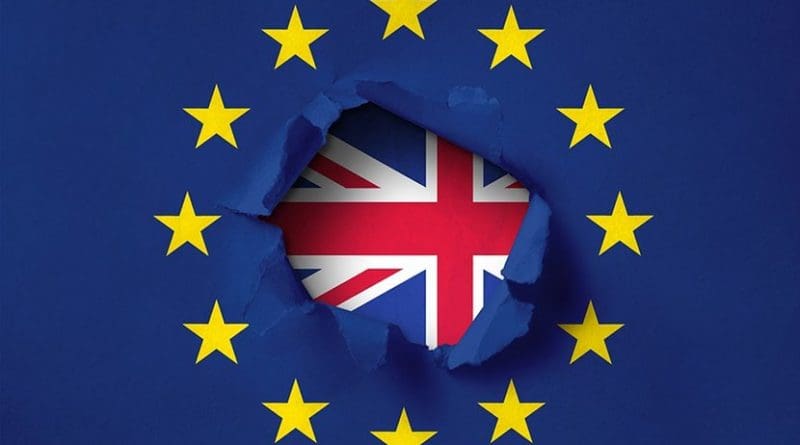The UK Government’s ‘Secret Plan’ To Slash Taxes After A No-Deal Brexit – OpEd
By MISES
By George Pickering*
With fewer than 50 days left to go until Britain is scheduled to leave the European Union, it is becoming increasingly certain that politicians on both sides will fail to reach any sort of formal agreement on Britain’s future relationship with the EU before the date of Brexit arrives. Prime Minister Theresa May’s long-negotiated Brexit Deal, the many flaws of which left it almost universally reviled, was overwhelmingly rejected in the House of Commons last month by a margin of 230 votes, the most severe defeat for a sitting government in history . Parliament’s refusal to back either Mrs May’s deal or any actionable alternative has moved the entire Brexit process into a sort of limbo period, where it is uncertain what the next step will be, or whether any further steps in any direction are even possible. With Mrs May’s only hope being a renegotiation of her deal in time for a repeat vote before the 29th March Brexit deadline, and the EU adamantly refusing to return to the negotiating table, it is easy to see why a no-deal Brexit is now so widely regarded as the most probable outcome.
It was to this backdrop that the British press recently began reporting on the development of ‘Project After’, which one Whitehall figure described as “basically a Doomsday list of economic levers we could pull” in the event of a no-deal Brexit. This ‘secret plan’, as it has ironically been called throughout its extensive media coverage, is supposed to be considering the viability of numerous different policy directions intended to offset the economic armageddon which mainstream pundits so widely expect to result from a no-deal Brexit. These possible policies include cuts to Britain’s corporation tax, value added tax (VAT), and even cutting all of Britain’s tariffs to zero . Project After appears to have begun life two years ago as a Department for International Trade initiative, but since last summer it has been taken over by Cabinet Secretary Sir Mark Sedwill, the most senior civil servant in the UK, with input from numerous key arms of government, including the Treasury, the Cabinet Office, and the Bank of England.
From the perspective of Austrian Economics, it would be difficult to view these proposed tax cuts as anything other than an unambiguous good, inasmuch as they represent a diminution of the government’s disruption of voluntary, mutually-beneficial economic interactions between private individuals; yet another reason to view a ‘hard’ no-deal as the least worst of the possible Brexit scenarios. However, the mainstream economic paradigm from which the UK government is approaching the problem of Brexit means that their motive for considering tax cuts is very different than that stemming from any principled understanding of the economic destructiveness of interventionism. Specifically, the tax cuts being considered as part of Project After are motivated by a more general desire to “stimulate” economic activity through government measures, and are hence packaged together with a host of other policy proposals which certainly could not be characterised as rolling back government hegemony over the British economy.
Other proposals being considered by Project After, alongside its proposed tax cuts, include massive increases in government spending, subsidies to key industries, and the raising of additional government revenue through the higher tariffs which would be allowed if a no-deal Brexit led to the UK adopting ‘WTO terms’ in its international trade. Furthermore, the government has been developing another plan alongside Project After, called ‘ Project Bluebell ’, which is investigating potential protectionist measures which could be implemented after a no-deal Brexit, to shelter Britain’s more politically powerful industries — pharmaceuticals, agriculture, car manufacturing, etc. — from the effects of international competition, at the expense of taxpayers and consumers.
Even the few liberalising reforms which are being considered have been significantly scaled back from what was originally on the table. One civil servant has alluded to the fact that, in the early stages of Project After, significant Singapore-style deregulation and relaxation of labor laws were being considered as possible routes to post-Brexit economic growth. However, Theresa May’s commitment to transpose the bulk of existing EU regulations into British law after Brexit, put an end to any hope for significant deregulation as an aspect of this plan.
This latter point vividly illustrates the inescapable importance of education as a necessary first step before any sustainable progress toward a voluntary, free market economy can realistically be hoped for. It is certainly tempting to allow oneself to believe that, with just the right combination of dramatic events — a no-deal Brexit and a ‘secret’ government plan, for example — a top-down implementation of economic liberty might be just around the corner. However, as the sixteenth century French philosopher Étienne de La Boétie so famously demonstrated , no widespread system of social interactions, whether it be the rule of a particular government or the existence of a certain type of economy, can continue to exist without the tacit consent of the general public who go on peacefully operating within it. Unless, through the long-term process of education in sound economics, the benefits of a free market economic system come to be broadly accepted by the general public, all attempts at top-down economic liberalisation will be, at best, incomplete and temporary, as were the reforms of the classical liberals of the nineteenth century. More likely, however, is that without this strong foundation of public consent, such top-down attempts at free market reform will simply never get off the ground to begin with, as will likely be the case for this ‘secret’ government plan to cut taxes after Brexit.
*About the author: George Pickering is a 2018 Mises Institute Research Fellow and a student of economic history at the London School of Economics.
Source: This article was published by the MISES Institute

